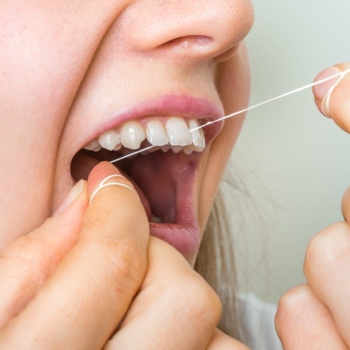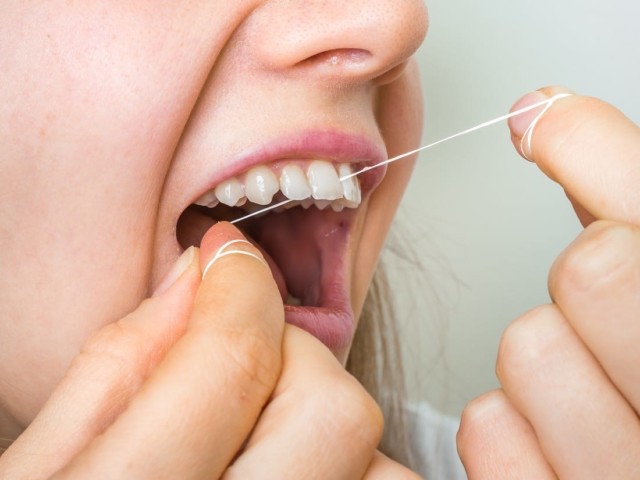

Have you noticed there is a lot more emphasis on brushing your teeth twice a day than there is flossing? We see advertisements for toothbrushes all the time, but we rarely have floss on our shopping list. So, what about flossing – is it even that important if you’re brushing twice a day?
Do we really need to floss?
The big answer is YES! In order to limit your risk of decay and other dental diseases, and keep your gums happy and healthy, your daily oral hygiene habits should generally consist of brushing twice a day AND flossing a minimum of once a day. This is because flossing removes the bacteria in areas that your toothbrush cannot reach– between your teeth and under the gums.
What happens If I don’t floss?
Flossing plays a major role in the general health of your mouth- from your teeth all the way to your gums and the most talked about issue conquered by flossing is your risk of tooth decay. Now here’s a bit of math… brushing alone will target 3 of the 5 tooth surfaces, and with the average mouth containing 32 teeth, this means you are only cleaning 60% of your teeth!
Gum health is also majorly impacted by your flossing habits. We like to think of your gums as the foundations to your mouth that hold the teeth in place, and without it there would be no teeth, and therefore an inability to do essential things like speak or chew. By incorporating flossing into your routine, you are getting rid of any bacteria and food debris from under the gums that may cause gum inflammation or disease.
How do I floss?
If you’ve never been taught how to properly floss, this can be a tricky step by step instruction over paper. But generally, any floss will do- make sure you have a firm grip on the floss, and gently see-saw the floss between your teeth. It doesn’t matter whether you start from the front or back of the mouth but do make sure to cleanse the floss after every tooth because you don’t want to be transferring bacteria from one area to another.
What age do we start flossing?
As soon as there are opposing teeth!
We’re not expecting 3-year old kids to be professional flossers but starting early gets them into a habit and increases their skills. With young age also comes limited manual dexterity, so it is the parent’s duty to do the actual flossing but let them have a go and make it fun!
What if I can’t floss?
It’s true- not everyone can floss. Dental work such as orthodontic braces, fixed lingual wires and bridges can limit an individual from using regular string floss. But where there is a will, there is a way!
Other ways to clean between your teeth and under the gums include ‘Superfloss’ and dental ‘Piksters’. If you’ve never heard of any of these, the dental professionals at Aim Dental Group are trained to provide you with options, and deliver on the spot demonstrations.
If I floss, will I still get decay?
By making flossing a habit, you will be cleaning more than the 60% of your tooth surfaces, reducing the amount of bacteria in your mouth and therefore reducing your risk of developing decay and any other dental diseases. Unfortunately, nothing is guaranteed and factors such as lifestyle, diet and genetics can still play a major role in the development of tooth decay. Be sure to keep up with your 6 monthly Active Maintenance appointments to keep your risk low.
Why do my gums bleed when I floss?
There are a few reasons as to why you might notice a bit of bleeding when flossing- If flossing is an irregular habit for you, your gums may bleed simply because they aren’t used to this foreign item being wedged between your teeth and under your gums. To combat this issue, simply incorporate flossing into your daily routine. Trauma to the gums may also cause some bleeding, so be sure you aren’t being too aggressive with the flossing and allows these areas to heal with time.
Lastly, bleeding when flossing can be a sign of gum disease, and more commonly gingivitis, which if the inflammation of the gums that can cause the gums to look puffy and bleed readily.
Now this can be very difficult to diagnose by yourself at home, so we recommend booking an appointment with one of our highly trained dental professionals to get to the bottom of your issue and ensure your gums are in tip top health!
Click here for our ‘Oral Hygiene at Home’ video with a demonstration on how to use a floss.
For further help regarding this topic, be sure to bring this up at your next 6 monthly Active Maintenance appointment, and any of our friendly dental professionals will be happy to run through all the nitty gritty details with you!
